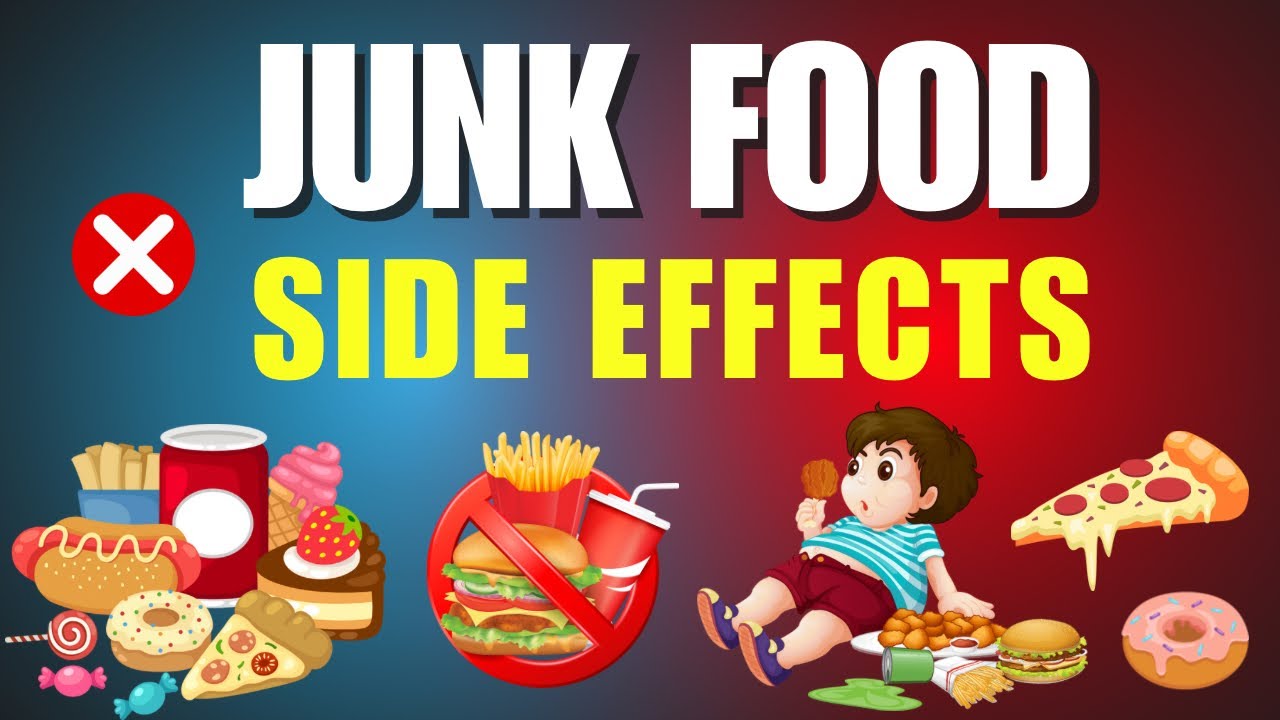The Hidden Dangers of Junk Food , In today’s fast-paced world, junk food has become an increasingly prevalent part of many people’s diets.
Characterized by high calories, low nutritional value, and often processed ingredients, these foods have far-reaching consequences that extend well beyond mere taste satisfaction.
This article delves deep into the multifaceted side effects of junk food, exploring its impact on physical health, mental well-being, and overall quality of life.
Nutritional Bankruptcy: Understanding the Fundamental Problem
Junk food represents a nutritional paradox. While these foods are typically calorie-dense, they are critically deficient in essential nutrients.
Most junk food items are manufactured with refined flours, added sugars, unhealthy fats, and numerous artificial additives.
This composition means that consumers are essentially consuming empty calories that provide little to no nutritional benefit to the body.
The Macro-Nutrient Imbalance
- Excessive Unhealthy Fats: Many junk food items are laden with trans fats and saturated fats, which are known to increase bad cholesterol levels and contribute to cardiovascular diseases.
- Refined Carbohydrates: These quickly convert to sugar in the body, causing rapid spikes in blood glucose levels followed by sudden crashes.
- Minimal Protein and Fiber: The absence of substantial protein and dietary fiber means these foods do not provide sustained energy or promote healthy digestion.
Physical Health Consequences
Obesity and Weight Management Challenges
Consistent consumption of junk food directly correlates with weight gain and obesity.
The high-calorie content, combined with low satiety value, encourages overeating.
Unlike nutritious whole foods that provide a feeling of fullness, junk food triggers continuous hunger pangs, creating a vicious cycle of overconsumption.
Cardiovascular Risks
The impact of junk food on heart health is profound and multifaceted:
- Increased risk of hypertension
- Higher likelihood of developing atherosclerosis
- Elevated triglyceride levels
- Compromised arterial health
- Greater probability of heart attacks and strokes
Metabolic Syndrome and Diabetes
Regular junk food consumption significantly disrupts metabolic processes:
- Insulin resistance develops more quickly
- Pancreatic function becomes compromised
- Blood sugar regulation becomes increasingly difficult
- Risk of type 2 diabetes increases dramatically
Digestive System Complications
The lack of dietary fiber and presence of artificial additives create numerous digestive challenges:
- Reduced gut microbiome diversity
- Increased instances of constipation
- Higher risk of inflammatory bowel conditions
- Compromised nutrient absorption capabilities
Psychological and Mental Health Implications
Cognitive Function Deterioration
Emerging research suggests a strong link between junk food consumption and cognitive decline:
- Reduced brain plasticity
- Potential acceleration of neurodegenerative processes
- Decreased concentration and memory capabilities
- Increased risk of depression and anxiety
Addiction-Like Behavioral Patterns
Junk food’s design triggers similar neurochemical responses to addictive substances:
- Dopamine release mimicking pleasure responses
- Development of food craving cycles
- Potential psychological dependency
- Disrupted natural hunger and satiety mechanisms
Immune System and Long-Term Health
Inflammation and Chronic Diseases
The consistent consumption of processed foods creates a state of chronic low-grade inflammation:
- Weakened immune system responses
- Increased susceptibility to infections
- Higher risk of autoimmune conditions
- Potential acceleration of aging processes
Hormonal Disruptions
Artificial ingredients and excess sugar interfere with hormonal balance:
- Thyroid function impairment
- Potential reproductive health challenges
- Disrupted stress response mechanisms
- Altered metabolic signaling
Environmental and Systemic Considerations
Broader Societal Impact
Junk food’s prevalence extends beyond individual health:
- Increased healthcare system burden
- Higher economic costs associated with treating diet-related diseases
- Environmental strain from food processing and packaging
- Potential intergenerational health implications
Strategies for Mitigation and Healthy Alternatives
Gradual Dietary Transformation
- Incorporate whole foods progressively
- Learn basic nutrition principles
- Practice mindful eating
- Develop home cooking skills
Nutritional Replacement Strategies
- Choose complex carbohydrates
- Opt for lean protein sources
- Increase vegetable and fruit intake
- Stay hydrated with water and herbal teas
Conclusion ( The Hidden Dangers of Junk Food )
The side effects of junk food are comprehensive and deeply concerning.
From immediate physical health challenges to long-term systemic risks, the consequences touch nearly every aspect of human well-being.
By understanding these impacts and making conscious dietary choices, individuals can protect their health and enhance their quality of life.
Ultimately, food is more than mere sustenance—it’s a critical component of overall health and wellness.
Each meal represents an opportunity to nourish the body, support bodily functions, and invest in long-term vitality.
The choice to move away from junk food is a powerful step towards holistic health and improved life quality.

Dr. Shabbir Hussain Bohra (Physio)
Owner & Founder – Physio Talk
Director – HAKIMI Physiotherapy Clinic, Nagpur
Dr. Shabbir Hussain Bohra is a dedicated physiotherapist with seven years of comprehensive experience in rehabilitation and specialized therapeutic care. He holds a Bachelor of Physiotherapy (BPT) degree and has established himself as a leading expert in oncology physiotherapy and lymphedema management. Currently serving as a Consultant Physiotherapist at Asian Kidney Hospital, Nagpur, director hakimi Physiotherapy clinic nagpur Dr. Bohra brings extensive expertise in treating complex medical conditions requiring specialized rehabilitation approaches. His dual specialization as an Onco-Physiotherapist and Lymphedema Therapist enables him to provide targeted care for cancer patients and individuals managing lymphatic disorders.
